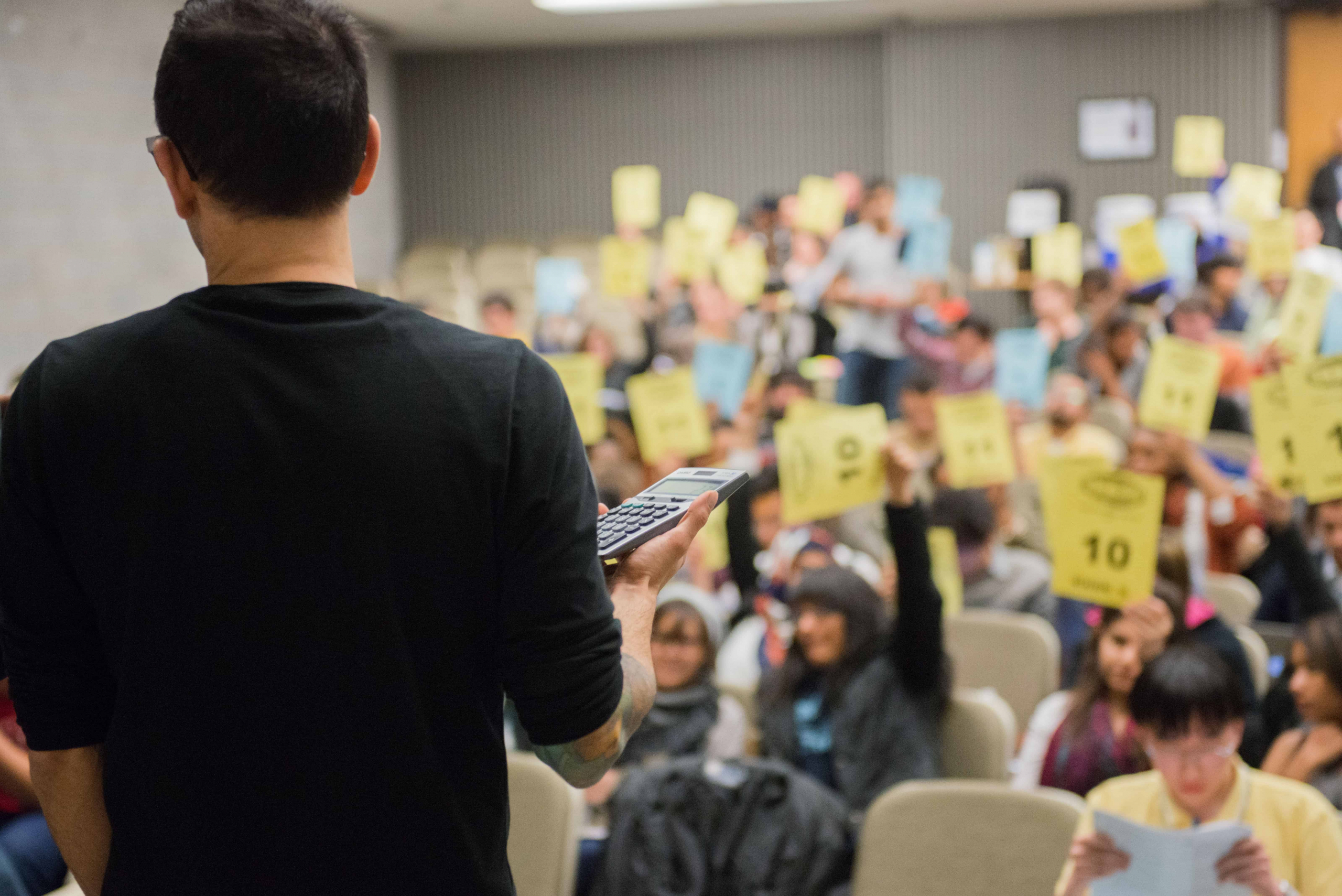Update: The UTSU Board of Directors met Wednesday evening to approve electoral policy recommended by the Elections and Referenda Committee (ERC) for the upcoming executive and board of director elections. The policy, which passed with an overwhelming majority, does not include online voting, nor any of the other major provisions outlined in the Non-Partisan Declaration on UTSU Electoral Reform, which was voted on by students at the SGM on Tuesday.
UTSU vice-president, internal & services Corey Scott explained that it was not procedurally possible to include any revisions to the policy coming out of Tuesday’s SGM because “Saturday was the last day to consider amendments to the electoral code.” UTSU president Shaun Shepherd, who indicated on Tuesday that he would speak in favour of online voting at the board meeting, did not attend.
Ashkon Hashemi, chair of both the board meeting and Tuesday’s SGM, explained that the only options the board had were to approve the recommendations of the ERC, or to send them back to change them. The union’s bylaws do not permit board members to alter the ERC’s recommendations in any way. The motion to implement online voting and consider the other parts of the Declaration was a directive-based, non-binding motion.
The union’s regulations require 72 hours notice to hold an emergency ERC meeting, and the union needed to finalize their rules by Wednesday night, in time for the nomination period for elections to open on Thursday. Several prominent opposition members had previously indicated to The Varsity that they would likely not pursue defederation referenda this year if online voting passed at the board meeting. Rishi Maharaj, president of the Engineering Society and Sam Greene, co-head of Trinity College, will meet with vice-provost, students Jill Matus on Thursday to discuss next steps.
A motion calling for online voting in UTSU elections was narrowly approved Tuesday night at the second part of the UTSU’s special general meeting (SGM), by a vote of 575–567.
UTSU president Shaun Shepherd said he was disappointed that repeated attempts to “offer the olive branch” to college heads had been ignored or rebuffed. Several colleges and faculties whose leaders backed the motion announced Sunday that they were considering severing ties with the union.
“I’m just so fed up with this school,” said Shepherd in the aftermath of the vote.
The motion called for online voting to be implemented in time for the upcoming UTSU election, and for the other recommendations of the Non-Partisan Declaration on Electoral Reform to be examined again.
An emergency meeting of the Elections & Referenda Committee (ERC) was held directly after the SGM. The Varsity was barred from attending that meeting.
Shepherd said the committee would make a formal recommendation to a regularly-scheduled meeting of the UTSU’s Board of Directors set for tomorrow.
“Irrespective of whether or not we agree with them, we have to honour them — that’s democracy,” said Shepherd, explaining that he planned to speak in favour of implementing online voting at Wednesday’s board meeting. Shepherd said his only concern was logistical: that the Office of Student Life would not be able to implement online voting in time.
Corey Scott, UTSU vice-president, internal & services and an ERC member, suggested during discussion of the motion that the university administration could not oversee the vote as it was a “conflict of interest,” since the university had an interest in the outcome of the election.
“The University has encouraged the use of online voting and has made available a secure process, UelecT, which many student groups currently use,” a university spokesperson said this weekend.
The union’s Elections & Referenda Committee has already made several changes to this year’s election process based on a recently-concluded legal review. The changes are limited to clarifications about times lines and appeals processes.
The motion calling for online voting is “directive-based,” and not a binding measure, unlike the bylaw amendments passed in prior meetings of the members.
Preparations for March’s election already appear to be underway, based on the minutes of the ERC. Chief returning officer Eric Luong is set to hire 45–50 poll clerks, and funds have already been set aside to book space for polling locations on campus. The Arts & Science and Graduate students’ unions have also been invited to select representatives for influential election appeal committees.
College leaders remained adamant. “If the union decides not to implement online voting and the recommendations passed at the SGM, they will be doing so in direct contradiction of the wishes of their members,” said Sam Greene, head of Trinity College and an early backer of the Declaration. “That would be egregious, both procedurally and morally.”
Nominations for UTSU elections open Thursday morning. Wednesday’s board meeting will determine whether and what, if any, changes to the electoral code will be made in time for this year’s elections.
The meeting was held simultaneously on two campuses, with students at the University of Toronto, Mississauga, using Skype to speak and vote. Chair Ashkon Hashemi said that the UTSU bylaws are “silent” on whether electronic participation is allowed, and permitted it on his own authority.
Following the vote on electoral reform, Hashemi ruled a motion calling for UTSU clubs’ membership to be comprised entirely of UTSU members out of order.
Quorum, the minimum number of people required to hold the meeting, was lost shortly thereafter, when a number of students left both the St. George-campus meeting room and the Skyped-in location in Mississauga abruptly. Remaining items, including GTA-wide transit passes and a mental health campaign, were not addressed. Union directors promised to raise both issues at tomorrow’s scheduled board meeting.


